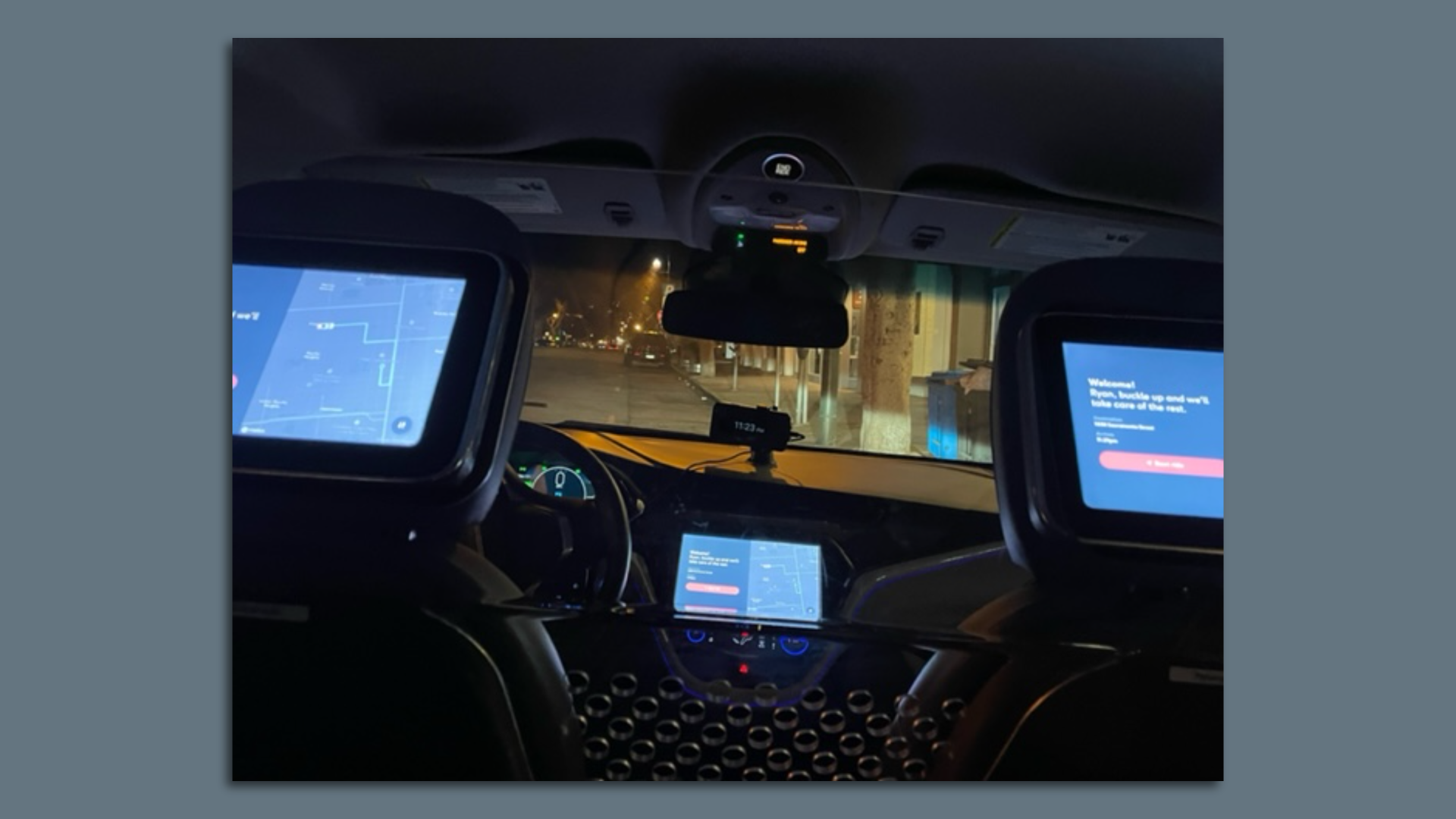| | | | | | | Presented By Robin Powered | | | | Axios What's Next | | By Jennifer A. Kingson, Joann Muller and Alex Fitzpatrick · May 25, 2022 | | Talk about a cool surprise in your inbox: What's Next reader Ryan Fager sent us a picture of his ride in one of the few autonomous vehicles available to the public in the U.S. - Check it out at the bottom of this newsletter — and thank you, Ryan!
- Got something that can top that? Email us at whatsnext@axios.com.
Today's Smart Brevity count: 1,195 words ... 4½ minutes. | | | | | | 1 big thing: The security deposit gets a makeover |  | | | Illustration: Natalie Peeples/Axios | | | | The tradition of paying a month's rent (or more) into a landlord's escrow account is being challenged by young companies that offer alternatives to the cash security deposit, Jennifer A. Kingson writes. - They're selling products like surety bonds, insurance policies and rent guarantees, and charging tenants nonrefundable monthly fees — typically $10-$30 — instead of a refundable upfront lump sum.
Why it matters: There's a lot of money at stake: An estimated $45 billion sits in security deposit accounts. And while the current system has its flaws, the alternatives also have pluses and minuses. - Critics say tenants can wind up paying a lot more than they would with a refundable security deposit, and that the products don't always offer the same protections.
- While the pitch is to renters, the companies are working for the landlords.
Driving the news: A legislative movement called "Renters Choice" is pressing cities and states to loosen laws around security deposits to give greater leeway to the new products, which are known collectively as "security deposit replacements," or SDRs. - Cincinnati and Atlanta have passed the first two laws.
How it works: Companies like SureDeposit, TheGuarantors, Rhino, LeaseLock and Obligo are busy signing up property owners; each of them has a different system. - They're not necessarily aimed at people who can't scrounge up a deposit, but rather at people who'd prefer to use their money elsewhere or don't trust their landlord to return it.
Rhino, an insurance broker, offers a new product it calls "security deposit insurance." - "It's insurance that the renter purchases for the landlord's benefit, in case there's unpaid rent or damages," Paraag Sarva, Rhino's CEO, tells Axios.
- A tenant whose rent is $3,000 a month, for example, would pay a monthly fee of $20 or so for a policy that would pay the landlord as much as $3,000 if there were problems when the tenant moved out.
- It's different from the traditional renter's insurance, which typically covers tens of thousands in damages after the tenant pays a deductible.
The other side: Tenant advocates point out that security deposits — while imperfect — come with a raft of legal protections. - "A lot of tenants are better off paying a traditional security deposit because that's a refundable payment," says Eric Dunn, director of litigation at the National Housing Law Project, which published an article on the pros and cons of the products.
Read the full story. |     | | | | | | 2. Axios Harris Poll 100: Automotive brands show resilience |  Data: The Harris Poll; Chart: Kavya Beheraj/Axios Faith in traditional automotive brands is stronger amid a wave of pandemic-related disruptions that underscored the importance of personal vehicles and the freedom to travel, new rankings from the Axios Harris Poll 100 suggest. - While Toyota (No. 7), Honda (No. 9) and Tesla (No. 12) were the three highest-rated car brands, General Motors' reputation rose the most in the annual survey, Joann Muller writes.
- GM climbed 16 spots, to No. 52, in the rankings of brand reputation, driven by big gains in attributes such as trust, vision and growth.
The big picture: People are often quick to dismiss legacy automakers like GM and Ford in favor of sexy newcomers. But these results show how deeply traditional car brands still resonate with everyday Americans, even as carmakers race to reinvent themselves for a new era. - GM said its improvement in the poll was "another proof point that we are making progress on our journey to create a world with zero crashes, zero emissions and zero congestion."
Details: Toyota climbed 11 spots and Ford (No. 41) climbed 9 spots in the Axios Harris poll, an annual survey to gauge the reputations of the 100 most visible brands in the country. - Honda, Tesla and Subaru (No. 20) all slipped in the rankings, but their reputations remain strong.
- Stellantis (No. 45), better known for its sub-brands like Jeep, Dodge and Ram, has a "very good" reputation a year after its rebranding through the merger of Fiat Chrysler Automobiles and PSA Groupe.
The bottom line: Don't write off Big Auto just yet. Share this story. |     | | | | | | 3. Now sailing: Your morning brew |  | | | Illustration: Eniola Odetunde/Axios | | | | Like everything else shipped around the world on huge, diesel-hungry cargo vessels, your morning cup of joe comes with a significant environmental cost, Alex Fitzpatrick writes. But what if there were a greener way to move coffee beans from port to port — say, for instance, by sailboat? A handful of coffee importers are trying exactly that, Bloomberg reports. - One such company, France-based Belco, imported 22 tons of Columbian coffee via schooner earlier this year.
- While more expensive than traditionally shipped varieties, the sailboat-shipped beans were such a hit with eco-conscious consumers that Belco now wants to sail up to 4,000 tons of beans from South America to Europe by 2025.
Why it matters: Shipping emits over 2% of the world's total carbon emissions, per TIME, and they're in the midst of a major, industry-wide push to reduce that figure. What's next: Shipbuilders in Europe, South America and elsewhere are responding to the newfound demand by designing bigger, better sailboats up to par with modern nautical standards. Yes, but: A flotilla of schooners won't make much of a dent in the global shipping industry's total carbon footprint, so it's still urgent for giants like Maersk to embrace alternative fuels and other emissions-reducing innovations. Share this story. |     | | | | | | A message from Robin Powered | | The steps to hybrid success | | |  | | | | Hybrid teams need connection and clearly defined expectations to thrive. The proof: Robin polled more than 300 hybrid employees, and 56% believe communication is key to successful leadership. Download the report to learn more about what people want from their hybrid employers. | | | | | | 4. Moon exploration company raises $12 million |  | | | A familiar friend — yet so far away. Photo: NASA/JPL | | | | Lunar Outpost, a company focused on building rovers and instruments to explore the Moon and mine its resources, has raised $12 million in seed funding, Miriam Kramer writes for Axios Space. Why it matters: The Moon is poised to become a major geopolitical and scientific center of operation in space, as more nations and companies turn their attention to the lunar surface. - A number of companies have plans to take advantage of that interest by figuring out how to extract resources from the Moon and get paid to do it.
What's happening: Lunar Outpost's seed round is expected to help fund the company's plans to build a new type of autonomous rover for the Moon and to amp up its current offerings. - Lunar Outpost already has a contract with NASA — for $1 — to collect some lunar dirt, which the space agency will then take possession of.
- The company plans to launch one of its rovers to the Moon within the next year.
Yes, but: This kind of work isn't easy, and the market for private companies aiming to send their wares to the Moon isn't yet defined. Read on. |     | | | | | | 5. Reader photo: Riding in an autonomous car |  | | | Looking out the windshield of a Cruise autonomous vehicle. Photo: Ryan Fager | | | | Axios What's Next reader Ryan Fager writes: "In San Francisco, they're beta-testing Cruise AVs with non-employee riders between 10:30pm-5:30am. Took one Thursday night, and it couldn't have been easier to call, meet and ride. - "It drove like a pretty cautious driver, and the route seemed optimized for safety, as it avoided especially complicated intersections."
- "It wasn't as nuanced as an Uber or Lyft would be in terms of finding a drop-off location, simply putting on blinkers and stopping near the location."
Go deeper: Here's one of Joann's latest updates on the state of the autonomous vehicle industry. - "In San Francisco, GM-backed Cruise is giving free rides to the public, but only in certain neighborhoods during overnight hours. It hopes to receive the first permit in California for a paid robotaxi service as early as June 2," she reports.
|     | | | | | | A message from Robin Powered | | This is what great hybrid leadership looks like | | |  | | | | The stakes are high to create thriving hybrid teams, so Robin polled 300 employees to learn what it takes. The results: 56% say communication is critical. Employees want leaders who intentionally build trust and relationships and establish a shared purpose. Read our report to discover what kinds of communication resonate best. | | | | Was this email forwarded to you? Get your daily dose of What's Next magic by signing up for our free newsletter here. |  | It's called Smart Brevity®. Over 200 orgs use it — in a tool called Axios HQ — to drive productivity with clearer workplace communications. | | | | | | Axios thanks our partners for supporting our newsletters. If you're interested in advertising, learn more here.
Sponsorship has no influence on editorial content. Axios, 3100 Clarendon Blvd, Suite 1300, Arlington VA 22201 | | | You received this email because you signed up for newsletters from Axios.
Change your preferences or unsubscribe here. | | | Was this email forwarded to you?
Sign up now to get Axios in your inbox. | | | | Follow Axios on social media:    | | | | | |









No comments:
Post a Comment